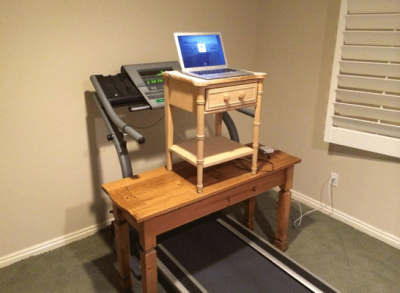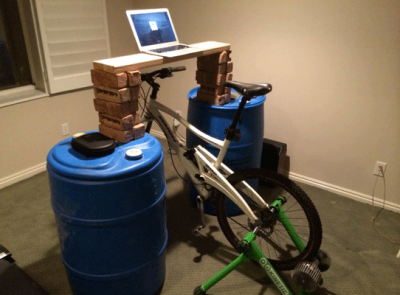#128 The Top 10 Causes of Weight Gain
October 25th, 2015 by Dr. John DayPodcast: Play in new window | Download
Subscribe: RSS
The Top 10 Causes of Weight Gain
The average American gains 1 to 2 pounds a year. That is as little as 10 extra calories a day–less than one bite of food. This weight gain is so subtle that most people don’t even know it is happening until one day they tune in and discover that they have gained 20 to 30 pounds since high school.
The famous 5th century B.C. Chinese General, Sun Zi, said in the book The Art of War, “If you know the enemy and yourself, you need not fear…If you know neither the enemy nor yourself, you will lose every battle.”
In this article, I am going to help you better know the enemy and share with you the top 10 causes of weight gain. It is only by knowing the enemy and yourself that you can enjoy the weight that works best for you.
My High School Weight
While not especially lean, I weighed a respectable 180 pounds in high school. My first year away at college, rather than “The Freshman 15,” I actually added “The Freshman 25” and hit a peak weight of 205 pounds during my first nine months away from home.
Fortunately, I started exercising again after my freshman year of college, which helped prevent further weight gain. However, it did not allow me to lose all of the weight I had gained. I carried that extra weight around for two more decades until my 40s when I was forced to change my diet and lifestyle due to other health problems.
The Best Study on Weight Gain
To better know the enemy, most of the scientific data I am going to share with you is from a seminal Harvard study published in the most prestigious medical journal, the New England Journal of Medicine. This study involved 120,877 U.S. men and women and the lead author was my former classmate, and fellow cardiologist, Dr. Dariush Mozaffarian.
What surprised me most about this Harvard study was that it wasn’t just one thing that cause people to gain weight. Rather, it was a cluster of bad habits and lifestyle choices that led to 1 or 2 extra pounds each year. Unfortunately, as the weight goes up so do chronic medical problems as well as the need to take lifelong medications and make appointments with the cardiologist or other doctors.
I should also point out that these top 10 causes of weight gain have also been seen in other studies. Also, the Harvard study did not show causation but rather correlation. In other words, weight gain was observed to happen in people who reported doing these 10 things–whether or not this was the actual cause of their weight gain cannot be determined from this Harvard study.
The Top 10 Causes of Weight Gain
1. Can’t Find Time to Exercise: 0.44 pounds/year (0.2 kg/yr)
It should come as no surprise that not exercising was the number one cause of weight gain. While a weight gain of just 0.44 pounds per year (0.2 kg/yr) may not sound like too much of a price to pay for not exercising, this adds up to a total weight gain of 21 pounds (9.4 kg) from high school to retirement at age 65.
While many people mistakingly feel that you can exercise off a bad diet, the research just doesn’t support this. Exercise is for maintaining not losing weight. Even during my marathon running years, when I was running 20 or more miles a day, I never seemed to burn off the extra weight I gained from my freshman year of college.
2. French Fries and Potato Chips: 0.42 pounds/year (0.19 kg/yr)
The number two cause of weight gain caught me by surprise. While I knew French fries and potato chips caused people to gain weight, I would never have predicted that this effect would be stronger than sugary drinks.
Even more surprising was that the average person in this study only ate French fries or potato chips one time per week at most. I suspect the reason why fries and chips are so dangerous to your waistline is because these processed potatoes are instantly converted to sugar in the body, they contain high amounts of unhealthy oils, and the same people who eat fries are more likely to eat other junk food as well.
As with a lack of exercise, this gradual weight gain from fries and chips, on average, adds up to a grand total of 20 extra pounds (9.1 kg) by retirement.
3. Trans Fat from Processed and Fried Foods: 0.36 pounds/year (0.16 kg/yr)
Number three in this Harvard study also came as a surprise to me. While I was well aware of the ultra artery clogging effects of trans fat, I had no idea this toxic fat also causes people to pack on the weight.
When it comes to trans fat in the diet, most of my patients mistakingly believe this is no longer a problem as all of their packaged food labels read “zero” for trans fat. What they don’t understand is that, based on lax reporting guidelines, processed food companies can create such unrealistically small portion sizes so that the trans fat content in a “microscopic serving” is below the required reporting level of 0.5 grams.
To keep your arteries clean and your weight in check, if you see “partially hydrogenated oil” anywhere on the ingredient list then this is something that you should never eat. When it comes to trans fat, there is no safe amount you can eat.
In addition to processed foods, the worst trans fat offenders are fried foods, microwave popcorn, and store bought bakery items. If you give in and eat processed or fried foods you can count on gaining an average of 17 pounds (7.7 kg) and a likely visit to a cardiologist by retirement age.
4. Sugary Drinks: 0.25 pounds/year (0.11 kg/yr)
While falling much lower on this list than I would have expected, sugary drinks are still an important cause of weight gain. In addition to sugary drinks, other forms of sugar like desserts, refined grains, and fruit juice combined also added up to an additional 0.25 pounds/year (0.11 kg/yr). By refined grains, I am referring to the typical grocery store breads, pastas, cereals, crackers, etc.
Thus, if you do sugary drinks, desserts, refined grains, and fruit juice you can expect to gain 0.5 pounds/yr (0.22 kg/year) from your sweet tooth–an even greater effect than not exercising.
It is interesting that fruit juice did not cause as much weight gain as sugar sweetened beverages like Gatorade or soda pop. The lead author of the Harvard study, Dr. Dariush Mozaffarian, was also surprised and explained that the reason was likely because they found that most people seem to drink sugary beverages in much greater quantities than fruit juice.
Once again, it did not take much to increase weight. The average person in this study only had a little more than 1 sugary drink per week and 1.3 servings of dessert and 1.2 servings of refined grains each day.
Regardless, doing all forms of sugar namely sugary drinks, desserts, refined grains, and fruit juice, even in very small amounts, can add up to a hefty 23.5 pound (10.7 kg) average weight gain by retirement.
5. Red Meat: 0.24 pounds/year (0.11 kg/yr)
For those who follow a dietary regimen that advocates meat, I’m sure the number five cause of weight gain in the Harvard study comes as a surprise. I should point out that all meats are not raised and processed equally, and that most of the 120 thousand plus people in this study were eating the typical grocery store or prepared forms of meat which come from antibiotic and hormone treated animals.
Equally as strong as red meat for weight gain in this study were processed meats. By processed meats I mean meats like bacon, hot dogs, sausage, and deli meats. If you eat processed meats you can expect to gain an additional 0.23 pounds each year. Thus, eating both red and processed meats will cause you to gain, on average, 0.47 pounds per year or 22 pounds (10 kg) by retirement.
I should point out that the people in this study did not eat much red or processed meats. Indeed, the average person had less than one serving daily of red and processed meats combined.
If you are a meat eater, and don’t want to gain weight, then the Harvard study would suggest giving up red meats as well as processed meats and instead focus on poultry or fish.
6. Stress: 0.15 pounds/year (0.07 kg/yr)
Most of us also know that we naturally crave junk food when we are feeling stressed. Stress causes changes to the hormones that regulate hunger. According to the study I use to calculate the damage from stress, you can also count on gaining an average of 7 extra pounds (3.2 kg) if you are under a lot of stress.
7. Sleep Deprivation, 0.14 pounds/year (0.06 kg/yr)
Most people intuitively know that they also crave junk food when they are tired. I know this is a weakness of mine after I have been up all night in the hospital taking care of patients. Sleep deprivation is a well known cause of activating our hunger hormones in a way that causes weight gain.
What most people don’t understand is that when it comes to weight gain, over sleeping seems to be just as dangerous as under sleeping. In a separate study I use to calculate the weight gain risks associated with sleep duration, it shows that sleeping under 5 hours or over 9 hours a night puts you at risk of weight gain.
Based on these definitions, if you under or over sleep you can count on gaining an average 7 extra pounds (3.5 kg) from high school to retirement.
8. Butter: 0.12 pounds/year (0.05 kg/yr)
In the 1980s and 90s a, few people would have been surprised to see butter on this list. Yes, it is true that butter is much healthier for you than the trans fat containing products, like margarine, from the 1980s and 1990s.
While butter made the top 10 based on the data from the Harvard study, I should point out that dairy had mixed effects when it came to weight gain or loss over time. For example, the Harvard study showed that cheese also caused weight gain but milk was neutral and yogurt even caused significant weight loss over time.
Thus, the type of dairy seems to be important in determining whether or not you gain or lose weight with dairy. For the worst dairy offender, butter, it can cause you to gain an average of 6 pounds (2.7 kg) from high school to retirement.
9. Alcohol: 0.1 pounds/year (0.05 kg/yr)
As with dairy, the data on alcohol and weight gain are mixed. Heavy beer drinkers seem to show the highest weight gains from alcohol. In the Harvard study, alcohol drinkers can expect to gain an average 0.1 pounds per year or 5 pounds (2.3 kg) by retirement.
10. Electronic Devices: 0.08 pounds/year (0.04 kg/yr)
Rounding out the top 10 list are electronic devices. When this Harvard study looked at television watchers, they found that just 36 minutes a day contributes to an average four extra pounds (1.7 kg) by retirement.
Final Thoughts
So there you have it, the scientifically proven 10 best ways to gain weight as an adult. When it comes to changing any bad habit, the first step is awareness.
As the 5th century B.C. famous Chinese general, Sun Zi taught us in The Art of War, the key to wining any battle is to know the enemy and yourself. Now that we have identified our top 10 enemies in weight gain, it is time to become aware and create an environment that helps us to conquer these enemies.
What is your number one weight gain enemy? What has helped you to battle this enemy?





